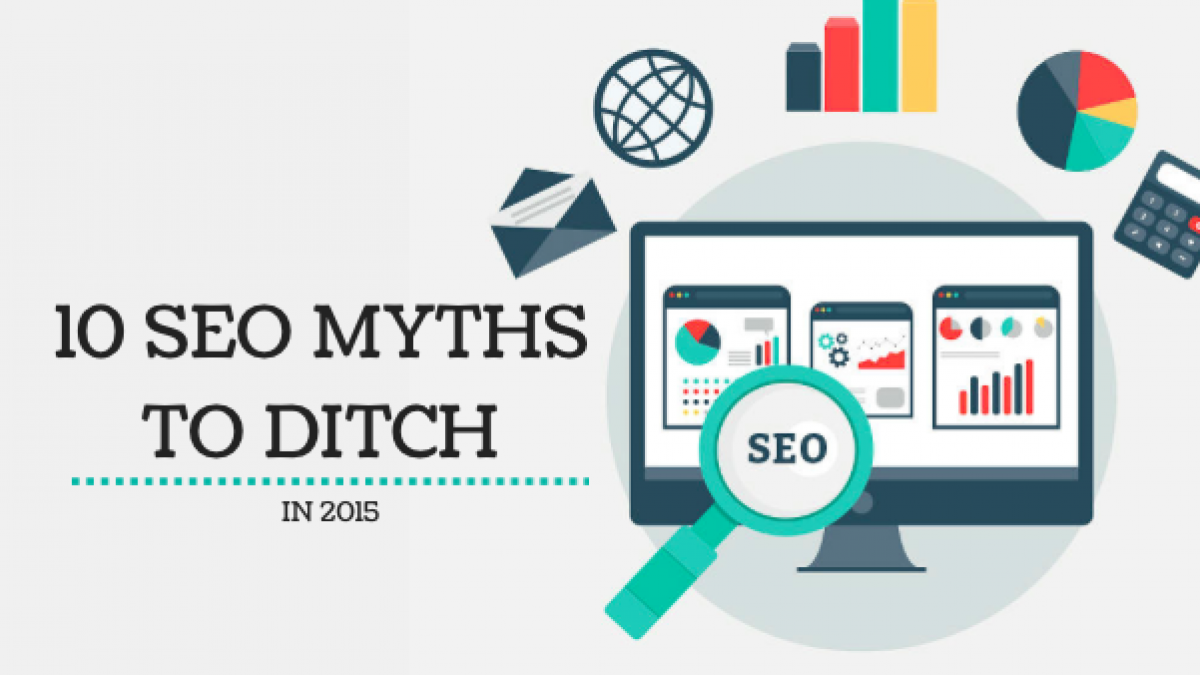
Ten SEO Myths to Ditch in 2015
When it comes to SEO, there are a lot of myths swirling around. Unfortunately, too many of those myths can be confused with facts, and end up being believed by individuals and companies who are trying to get ahead online. They end up doing the wrong things, or scrapping the good ideas because they're taking too long, which can put them further behind. Here are 10 SEO myths you really need to let go of this year.
1. Build it and people will come
Not true. Even if you build a great site, full of wonderful content, people aren't going to be flocking to it. They won't even know it's there. The only way most of them will ever find your site will be through frequent updates with the right SEO, promoting through social media and plenty of patience. It takes time to build an empire, but it also takes the right techniques and a lot of work. Just putting something out there isn't enough.
2. SEO is dead
It really isn't. It has changed, though, which means all the people who are still using it the old way think it's dead. They don't realize that they need to make adjustments, and they only see that what they're doing isn't working anymore. Since they still think they know what they're doing, and it isn't working anymore, it must be the fault of "dead" SEO that isn't useful to them any longer. They move on to something else, but since they stop doing SEO at all, they end up worse off than when they started.
3. SEO is cheap
True and false. You can get SEO for cheap. Getting good SEO, though, is most definitely not cheap. It's much more than just letting someone get hold of your site's content and adjust the keywords in it. There are tags, titles, and behind-the-scenes things that go on all the time, along with constant changes and updates that need to be made. SEO is like a living thing, and it needs to be fed and attended to. That isn't cheap, nor should it be. With SEO, you really do get what you pay for.
4. SEO can't be used with content marketing
Of course it can! People think that SEO is about a bunch of strategically placed keywords to keep search engines happy, and that content marketing is all about appealing to the reader. Those things are broadly true, but there's absolutely no reason the two have to be mutually exclusive. It is not that difficult to put good keywords that make sense into a very readable piece of information. The combination of the two is actually win-win, because it makes readers and search engines both happy. It's hard to think of something internet-related that's better than that when it comes to getting noticed online.
5. Position (rank) isn't important
Position or rank is nearly everything. Ranking #1 is obviously best, but you've at least got to get on the first page. When people search for something, most of them never go beyond page one of their search results. They might go to page two if they are really looking for something important or digging deep into a particular area of knowledge, but they generally see the top results as the best results, so those are what they click on. They find what they need, and they're off to the next thing. You need to rank as high as possible.
6. SEO doesn't matter
Are people crazy? SEO matters a lot. It's not everything, and it's theoretically possible to have success without it, but it's what search engines look for. If you want to be found, and you want people to like what they see once they find you, SEO should be a big part of what you're focused on. You can write amazing content, but if the search engines don't pick it up and put it high up in the search results, most people are never going to know that you wrote anything at all.
7. Keyword density is important
Sort of, but not really. Or maybe more accurately, it's only important if you overdo it - in which case you'll kill any chance you had of ranking well. You absolutely can't spam your keywords. Search engines have all changed their algorithms, which are now set to avoid high rankings for sites that use a keyword too many times. Don't end up with a lousy ranking because you got overzealous with a keyword. If you write naturally, for your reader, with your keywords in mind, they'll probably be about the right density (i.e. included in the content but not shoved in there a few extra times).
8. SEO is a quick fix
No. Just, no. Truly good SEO takes time. It's very important for anyone who's posting online to understand that. You can start up a great site and pay big money for SEO, but it will still take time for your site to rank well. Take a deep breath. Get a cup of coffee or something. Wait. Your site ranking will improve if you keep doing the right things - and then it should stay highly ranked, provided you don't start doing the wrong things. SEO is an excellent and valuable tool, but it's definitely not a quick fix.
9. Paid search means higher ranking
It would seem that way, but it's just not true. You can spend all the money you want on ads and Pay-Per-Click options, but it won't help your site ranking one bit. That doesn't mean those PPC ad choices are bad ones, but you just have to remember what they're used for. They're there to be used as ads. You want people to click on them, see what you're selling, and buy one - or buy a whole bunch. Don't stop using them, but don't expect them to catapult you up the search engine ranks. It just won't happen.
10. SEO is magic
Seriously? Who comes up with this stuff? SEO isn't magic. It's not Voodoo, and praying about it won't help, either. What SEO is, is a great tool for people who want to be successful online and have their sites get found in search results. That's all it is, all it does, and all it's for. When people start making SEO or any other technique out to be some kind of god, they really get caught up in thinking it's everything to them and their online presence. Take a step back and treat SEO like the valuable tool it is. No worshipping necessary.
It can be hard to let go of these myths. Some of them have become so ingrained that it's hard to know what to believe. Others just plain sound good, or people want them to be true. Unfortunately, people who get caught up in them can lose a lot of valuable time when they could be focused on doing the right things to get their site's ranking to improve. Make sure you understand what SEO is - and what it isn't - so you can make the best choices for your business. That's how you keep pace with, and even get ahead of, the competition.

